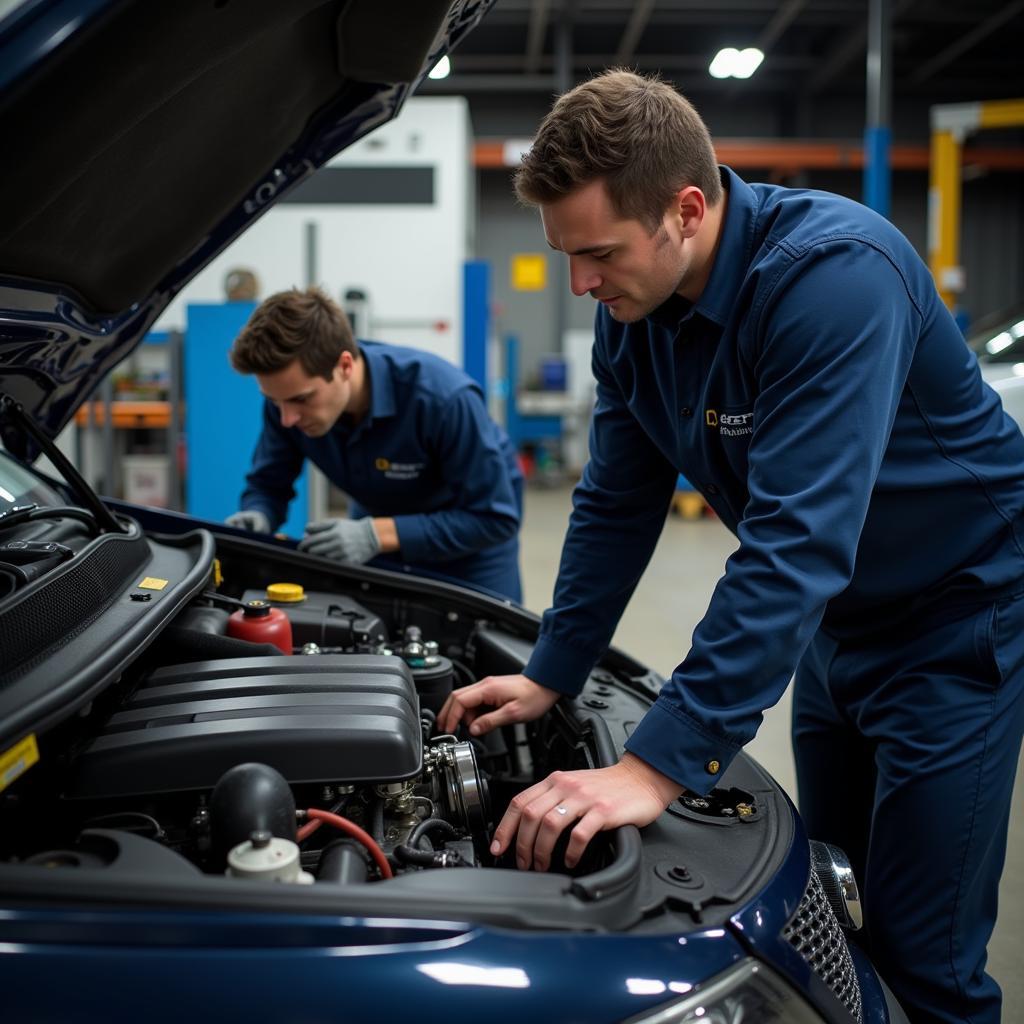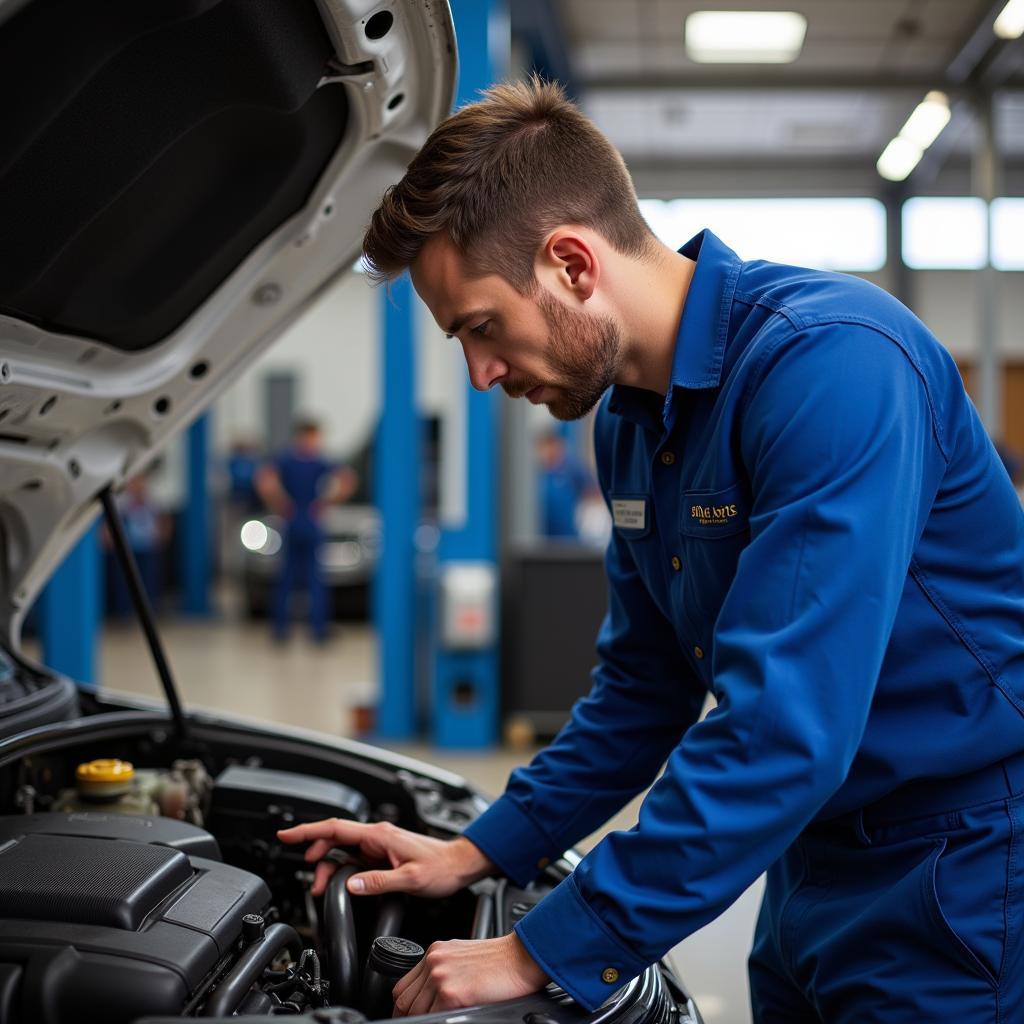How Often Should You Full Service a Car?
Owning a car comes with responsibilities, and one of the most important is regular maintenance. But How Often Should You Full Service A Car? The answer isn’t always straightforward, as it depends on several factors specific to your vehicle and driving habits. This article dives deep into understanding car servicing intervals and helps you determine the best schedule for your car.
Decoding the Full Service
Before delving into the frequency, it’s crucial to understand what constitutes a full car service. Unlike a basic oil change, a full service is a comprehensive checkup that goes beyond the essentials. It typically includes:
- Oil and Filter Change: The lifeblood of your engine, fresh oil, and a new filter are crucial for smooth operation.
- Fluid Level Checks & Top-ups: This includes brake fluid, coolant, power steering fluid, and windshield washer fluid.
- Tire Inspection: Checking tire pressure, tread depth, and overall condition ensures optimal safety and fuel efficiency.
- Brake Inspection: Examining brake pads, discs, and lines ensures your car can stop safely and effectively.
- Battery Test: Analyzing the battery’s charge and condition helps avoid unexpected breakdowns.
- Lights Check: Ensuring all lights (headlights, taillights, indicators) function correctly for safety and visibility.
- Exhaust System Inspection: Checking for leaks or damage in the exhaust system helps maintain optimal engine performance and reduces emissions.
- Steering and Suspension Check: Examining these components ensures smooth handling and a comfortable ride.
- Diagnostic Scan: Modern cars rely heavily on electronics. A diagnostic scan can detect hidden issues before they become major problems.
Factors Influencing Service Intervals
While general guidelines exist, several factors can influence how often you should full service your car:
- Manufacturer Recommendations: Always refer to your car’s owner’s manual. It outlines the recommended service intervals for your specific make and model.
- Driving Conditions: Frequent city driving, stop-and-go traffic, and extreme weather conditions can put extra stress on your car, requiring more frequent servicing.
- Mileage: High mileage vehicles generally require more frequent servicing than those driven less often.
- Age of the Car: As cars age, components wear out, necessitating more frequent checks and replacements.
General Guidelines for Full Service
While manufacturer recommendations take precedence, here’s a general guideline for car servicing:
- New Cars: Most new cars benefit from a full service after the first 12 months or 10,000 miles, whichever comes first.
- Regular Use: For vehicles driven under normal conditions, a full service every 12,000 miles or 12 months is a good starting point.
- Demanding Conditions: If you frequently drive in heavy traffic, harsh weather, or tow heavy loads, consider a full service every 6,000 miles or 6 months.
Listening to Your Car
Beyond the scheduled service intervals, paying attention to your car’s warning signs is crucial:
- Unusual Noises: Strange sounds like grinding, squealing, or knocking can indicate a problem requiring immediate attention.
- Warning Lights: Never ignore dashboard warning lights. They serve as your car’s communication system for potential issues.
- Fluid Leaks: Unexplained fluid puddles under your car can indicate leaks that need immediate inspection.
- Changes in Performance: A sudden decrease in fuel efficiency, unusual vibrations, or difficulty starting can signify underlying problems.
Benefits of Regular Full Service
Sticking to a regular full service schedule offers significant benefits:
- Increased Safety: Regular maintenance ensures all safety-critical components, like brakes and tires, function optimally.
- Improved Performance: Well-maintained cars run smoother, deliver better fuel efficiency, and have a longer lifespan.
- Reduced Risk of Breakdowns: Regular checks can identify and address potential issues before they become costly repairs.
- Higher Resale Value: A well-documented service history increases your car’s desirability and resale value.
Expert Insight
“Many car owners underestimate the importance of a comprehensive full car service,” says John Miller, a veteran mechanic with over 20 years of experience. “It’s not just about keeping your car running; it’s about ensuring your safety and maximizing the lifespan of your investment. Regular servicing can save you money in the long run by preventing major repairs down the line.”
 Experienced Mechanic Inspecting a Car
Experienced Mechanic Inspecting a Car
Conclusion
Determining how often to full service a car is a nuanced decision based on various factors. While general guidelines offer a good starting point, always prioritize your manufacturer’s recommendations and pay attention to your car’s unique needs. Remember, regular servicing is an investment in your safety, your car’s longevity, and your peace of mind.
FAQs
1. Is a full service the same as an interim service?
No, a full service is more comprehensive than an interim service. While an interim service focuses on essential checks and fluid top-ups, a full service covers a wider range of components and includes more in-depth inspections.
2. Can I perform a full service myself?
While some car maintenance tasks can be done at home, it’s best to leave a full service to qualified mechanics. They have the expertise, tools, and knowledge to identify and address potential issues effectively.
3. What happens if I delay my car service?
Delaying your car service can lead to several problems, including reduced fuel efficiency, increased wear and tear on components, and a higher risk of breakdowns. It can also void your warranty in some cases.
4. How do I find a reputable mechanic for my car service?
Look for certified mechanics, ask for recommendations from friends or family, and read online reviews. Choosing a reputable mechanic ensures quality service and peace of mind.
5. What should I do if I notice a problem with my car between services?
Don’t ignore any warning signs. If you experience unusual noises, warning lights, or changes in performance, take your car to a qualified mechanic immediately.
Need assistance with your car service? Contact our team of experts 24/7 via WhatsApp: +1(641)206-8880 or Email: [email protected]. We’re here to help!

